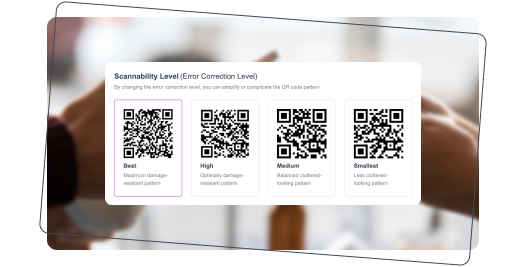Some useful Things for you
We have selected some interesting things that may be interest for you
Data Matrix et QR Code : Déchiffrer les distinctions
Pour créer un code QR pour un lien, une vidéo ou une image - cliquez sur le bouton ci-dessous.

Plan d'article
Le besoin de solutions de gestion de données efficaces et fiables est devenu primordial. Parmi les nombreuses technologies développées pour répondre à ce besoin, le Data Matrix et les codes QR se distinguent par leur polyvalence et leur utilisation généralisée.
Cet article examine les différences entre les codes QR et les matrices de données, en explorant leurs avantages, fonctionnalités et applications respectifs dans divers secteurs. En comprenant ces différences, les entreprises et les particuliers peuvent prendre des décisions éclairées sur le type de code qui correspond le mieux à leurs besoins.
Introduction à Data Matrix et aux codes QR
Les codes Data Matrix et QR sont deux types de codes-barres bidimensionnels (2D) qui stockent les données dans un format compact et lisible par machine. Contrairement aux codes-barres linéaires traditionnels, qui stockent les données dans une série de lignes et d'espaces, les codes-barres 2D utilisent des motifs de carrés, de points ou d'autres formes pour coder les informations. Cela leur permet de stocker plus de données dans un espace plus petit, ce qui les rend idéaux pour une large gamme d'applications.

Présentation des codes 2D
Les codes 2D, tels que les codes Data Matrix et QR, représentent une évolution des codes-barres linéaires classiques. Ils sont capables de stocker beaucoup plus d'informations, qui peuvent inclure des caractères numériques, alphanumériques, binaires et même Kanji.
Le principal avantage des codes 2D est leur capacité à contenir de grandes quantités de données dans un format compact et facilement numérisable. Cette capacité a conduit à leur adoption généralisée dans divers secteurs, les codes QR étant particulièrement populaires en raison de leur facilité d'utilisation et de leur polyvalence.

Importance de Data Matrix et des codes QR
Les codes Data Matrix et QR sont devenus des outils incontournables dans la gestion des données et la logistique modernes. Ils améliorent la précision et l'efficacité de la saisie des données, réduisent les erreurs et facilitent l'accès rapide aux informations.
Les codes QR, en particulier, ont acquis une immense popularité en raison de leur facilité de numérisation et de leur large reconnaissance, ce qui en fait un choix privilégié pour de nombreuses applications telles que le marketing , la vente au détail et le transport.
Comprendre les codes QR
Pour apprécier pleinement les capacités et les avantages des codes QR, il est essentiel d’approfondir leur structure, leurs fonctionnalités et leurs utilisations courantes dans divers secteurs.

Qu'est-ce qu'un code QR ?
Un code QR (Quick Response) est un type de code-barres 2D qui peut stocker différents types d'informations, telles que des URL , des informations de contact et du texte . Il se compose de carrés noirs disposés sur un fond blanc, qui peuvent être scannés par un appareil équipé d'une caméra pour récupérer rapidement les informations codées. Les codes QR sont conçus pour être lus rapidement et facilement, ce qui les rend très conviviaux.

Comment fonctionnent les codes QR
Les codes QR fonctionnent en codant les données dans un motif de carrés noirs et blancs. Une fois scannés, le lecteur de codes QR décode le motif en une chaîne de données. Ce processus comprend plusieurs étapes, notamment la capture d'image, la binarisation (conversion de l'image en noir et blanc) et le décodage du motif à l'aide de la correction d'erreur Reed-Solomon. Cette capacité de correction d'erreur garantit que les codes QR peuvent toujours être lus avec précision même s'ils sont partiellement endommagés ou masqués.
Utilisations courantes des codes QR
Les codes QR sont utilisés dans une grande variété d'applications en raison de leur polyvalence et de leur facilité d'utilisation. Voici quelques utilisations courantes :





Soins de santé :les codes QR peuvent stocker les informations sur les patients, rationaliser les enregistrements et gérer les dossiers médicaux.
Ces exemples illustrent la large applicabilité et la commodité des codes QR. Pour créer et gérer ces codes, ME-QR propose un générateur de codes QR convivial , facilitant ainsi la mise en œuvre de codes QR dans diverses applications.
Placez votre lien de code QR, ajoutez un nom pour votre QR, sélectionnez la catégorie de contenu et générez !
Placez votre lien de code QR, ajoutez un nom pour votre QR, sélectionnez la catégorie de contenu et générez !

Comprendre les codes Data Matrix
Les codes Data Matrix jouent également un rôle crucial dans diverses industries, en particulier lorsque l'espace est limité et qu'une capacité de données élevée est requise.

Qu'est-ce qu'un code Data Matrix ?
Un code Data Matrix est un type de code-barres 2D qui encode des données selon un motif de cellules noires et blanches. Ces codes peuvent stocker de grandes quantités de données dans un espace réduit, ce qui les rend idéaux pour les applications où l'espace est limité. Les codes Data Matrix sont particulièrement adaptés au codage de données textuelles et numériques, et ils sont souvent utilisés dans la fabrication et la logistique.

Comment fonctionnent les codes Data Matrix
Les codes Data Matrix fonctionnent en codant les données dans un motif de cellules carrées ou rectangulaires. Le motif est lu par un scanner, qui convertit l'image en données à l'aide d'algorithmes qui décodent le motif. Comme les codes QR, les codes Data Matrix utilisent des techniques de correction d'erreur pour garantir que les données peuvent être lues avec précision même si le code est partiellement endommagé.
Utilisations courantes des codes DataMatrix
Les codes Data Matrix sont couramment utilisés dans les secteurs où l'espace est limité et où une grande capacité de données est nécessaire. Les utilisations courantes incluent :



Ces applications démontrent l’importance des codes Data Matrix dans les environnements où un codage efficace des données dans un espace limité est crucial.
Code Data Matrix vs. Code QR : principales différences
Bien que les codes Data Matrix et QR soient tous deux efficaces à des fins différentes, ils présentent des différences distinctes qui les rendent adaptés à des applications spécifiques.

Différences visuelles
Visuellement, les codes Data Matrix et QR se distinguent par leur apparence. Les codes QR sont généralement plus grands et comprennent des motifs distinctifs de carrés et de marqueurs de positionnement dans trois coins.
En revanche, les codes Data Matrix sont plus compacts et peuvent apparaître sous forme de motifs carrés ou rectangulaires de points ou de carrés, sans les marqueurs de positionnement observés dans les codes QR.

Capacités d'encodage
Les deux types de codes codent les informations à l'aide de techniques différentes. Les codes QR peuvent stocker des types de données numériques, alphanumériques, binaires et Kanji, ce qui les rend très polyvalents.
Les codes Data Matrix, bien qu'ils soient également capables de coder une variété de types de données, sont souvent utilisés pour de plus petites quantités de données en raison de leur taille compacte et de leur efficacité.

Taille et capacité
En termes de taille et de capacité de données, les codes QR offrent généralement un bon équilibre, étant facilement lisibles tout en stockant des quantités importantes de données.
Les codes Data Matrix peuvent stocker une grande quantité de données par rapport à leur taille, ce qui les rend utiles pour les applications où l'espace est limité.

Niveaux de correction d'erreur
La correction des erreurs est essentielle pour garantir l'intégrité des données des codes-barres. Les codes QR utilisent la correction d'erreur Reed-Solomon, qui permet d'endommager jusqu'à 30 % du code sans perte de données.
Les codes Data Matrix ont également de robustes capacités de correction d’erreurs, mais les codes QR sont généralement plus fiables en termes de performances de correction d’erreurs.

Lisibilité et vitesse de numérisation
Les codes QR sont conçus pour une lecture rapide et facile, ce qui les rend très conviviaux et efficaces. Leur conception et leur utilisation généralisée signifient que de nombreux appareils et applications sont optimisés pour la lecture des codes QR, garantissant une lecture rapide et fiable.
Les codes Data Matrix, bien que fiables, peuvent ne pas être lus de manière aussi intuitive par tous les appareils, en particulier les équipements grand public.
QR vs. Data Matrix dans différents secteurs
Les codes Data Matrix et QR trouvent tous deux des applications dans divers secteurs, mais leur efficacité peut varier en fonction des exigences spécifiques de chaque secteur.

Data Matrix et code QR dans la fabrication
Dans le secteur manufacturier, les codes Data Matrix et QR sont tous deux utilisés pour le suivi et le contrôle qualité. Les codes Data Matrix sont privilégiés pour leur taille compacte et leur grande capacité de données, ce qui les rend idéaux pour le marquage de petits composants. Cependant, les codes QR sont souvent préférés pour leur facilité d'utilisation et leur reconnaissance généralisée.

Code QR vs matrice 2D dans le commerce de détail
Dans le secteur de la vente au détail, les codes QR sont largement utilisés pour les informations sur les produits, le marketing et l'engagement client. Leur capacité à stocker des URL et d'autres types de données les rend parfaits pour connecter les clients au contenu numérique. Les codes Data Matrix sont moins courants dans le commerce de détail en raison de leur conception moins intuitive et des exigences de numérisation.

GS1 Data Matrix vs. QR Code dans la logistique
Dans le domaine de la logistique, les codes GS1 Data Matrix et QR sont tous deux utilisés pour gérer les chaînes d'approvisionnement et suivre les expéditions. Alors que les codes Data Matrix sont efficaces pour encoder de grandes quantités de données dans un espace réduit, les codes QR sont généralement préférés pour leur polyvalence et leur facilité de numérisation.
Data Matrix vs QR : avantages et inconvénients
Les codes QR et les codes Data Matrix présentent tous deux leurs propres avantages et inconvénients, qui peuvent influencer leur adéquation à différentes applications.

Avantages et inconvénients de l'utilisation des codes QR
L’utilisation de codes QR offre plusieurs avantages et certains inconvénients potentiels.
-
Facile à numériser et à utiliser avec des appareils grand public.
-
Capacités polyvalentes de codage de données.
-
Correction d'erreur robuste.
-
Largement reconnu et utilisé.
-
Taille physique plus grande par rapport aux codes Data Matrix.
-
Peut être moins efficace en termes d'espace.
Ces avantages et inconvénients soulignent pourquoi les codes QR sont populaires dans de nombreuses applications destinées aux consommateurs, malgré leur taille plus grande.
Avantages et inconvénients de l'utilisation de codes Datamatrix
Les codes Data Matrix offrent également des avantages uniques et certaines limitations.
-
Grande capacité de données dans un format compact.
-
Efficace pour les petits composants et produits.
-
Correction d'erreur robuste.
-
Conception et processus de numérisation moins intuitifs.
-
Pas aussi largement reconnu que les codes QR.
Ces caractéristiques rendent les codes Data Matrix particulièrement adaptés aux industries où l’espace et la capacité des données sont des considérations critiques.
Choisir entre les codes Data Matrix et QR
Le choix d'un code à barres Data Matrix ou d'un code QR dépend de plusieurs facteurs, notamment des exigences spécifiques de votre secteur et de votre application.

Facteurs à prendre en compte
Lorsque vous choisissez entre les codes Data Matrix et les codes QR, tenez compte des facteurs suivants :
-
Besoins en données : les codes QR sont plus adaptés à l'encodage des URL et de divers types de données, tandis que les codes Data Matrix excellent dans le stockage de données peu encombrant.
-
Contraintes d'espace : les codes Data Matrix sont idéaux pour les petits espaces, tandis que les codes QR nécessitent plus d'espace mais offrent une plus grande polyvalence.
-
Technologie de numérisation : les codes QR sont plus conviviaux et largement pris en charge par les appareils grand public via un scanner de codes QR .
Cette comparaison entre une matrice de données et un code QR peut vous aider à prendre une décision sur le type de code le plus adapté à vos besoins.
Recommandations spécifiques à l'industrie
Pour la plupart des applications, les codes QR sont recommandés en raison de leur polyvalence et de leur facilité d'utilisation. Cependant, dans les secteurs où l'espace est limité et où une capacité de données élevée est essentielle, comme la fabrication et la santé, les codes Data Matrix peuvent être plus adaptés.

Conclusion
Les codes Data Matrix et QR offrent tous deux des avantages uniques et sont adaptés à différentes applications. Alors que les codes Data Matrix sont très efficaces en termes d'espace et de capacité de données, les codes QR sont généralement plus polyvalents, plus faciles à utiliser et largement reconnus. Lorsque vous choisissez entre les deux, tenez compte des besoins spécifiques de votre secteur et de votre application. Dans l'ensemble, les codes QR offrent souvent un meilleur équilibre entre fonctionnalité et convivialité, ce qui en fait un choix populaire dans de nombreux domaines.






























